Converging for CSR
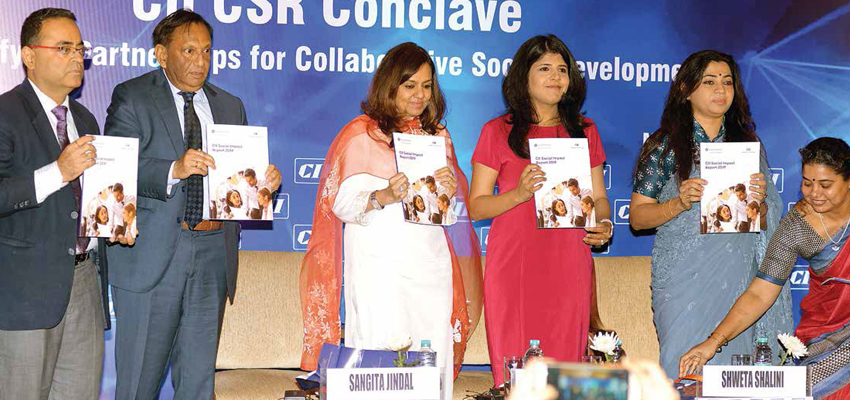
Corporate Social Responsibility (CSR) is a term that gets tossed along a lot, what does it really entail? What are the efforts that go into making a CSR initiative successful? How are the various partnerships between government bodies and private stakeholders forged? These are some of the questions that CII has attempted to address through their CII CSR Conclave, which aimed to identify partnerships for collaborative social development. In the inaugural theme panel on identifying partnerships for Scale, Sustainability and Success, Swati Khandelwal, Executive Editor of Zee Business, hosted Shweta Shalini, BJP Spokesperson and Advisor to (Former) Maharashtra CM Devendra Fadnavis and Sangita Jindal, Chairperson, JSW Foundation in a riveting discussion, after a foreword by Biswadip Gupta, CEO - JSW Foundation
" It’s heartening to see that many collaborations are formed between the government, the corporate sector, NGOs and a large number of international partners "
- Biswadip Gupta
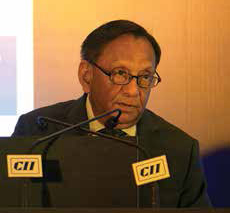
The objective of this conclave is to identify partnerships. It is to build larger-scale social development. We have to identify how these partnerships help us in enlarging our scope, our scales, and how it enhances our ability to take projects forward. The concept of Corporate Social Responsibility has changed dramatically over the last few years. Corporates today don’t only want to provide funds. Today, they are looking at a far deeper involvement. Most organizations prefer a more active involvement in the projects funded by them, and this is something I am actively seeing since the last 2-3 years. Corporates would also like to actively contribute to the fields where their money is being donated. Popularly, organizations operate their own projects in a joint effort with their target communities or by establishing partnerships with small organisations or third party implementers. Voluntarism is also getting popular as an interactive form of participation. From the recent trends, an upsurge of social development initiatives seems to be and, is in fact, a key to developing effective and scalable initiatives. It’s heartening to see that many such collaborations are formed between the government, the corpo-rate sector, NGOs and a large number of international partners. This helps in complementing each other’s strengths and offsetting many challenges. Throughout numerous cross industry interactions, we realized that there was a need to organize a session where key stakeholders of the CSR eco-system could meet. The platform was conceived with the objective of showcasing the initiatives of social development of corporates, government departments and foundations having done extensive work in CSR. We hope that through this platform, we will facilitate partnerships for more leverage and scales for social development. We have a very eminent group of panelists here today, who have in the own way, contributed immensely to social development. We would love to hear them and their views and imbibe these learnings in our initiatives. Swati Khandelwal, Executive Editor, Zee Business will now chair the panel.
Swati Khandelwal: As very aptly put by Mr Gupta, this is going to be a very interactive session. The kind of work these lovely ladies who are with me today are doing in CSR is amazing and extremely rewarding. Let’s start by understanding from each of them the kind of work that they do and where is it that they are positioned and how they plan to take it to the next level. And then, of course, we shall get into the partnerships, scaling and scope for sustainability. Let me begin with Sangita Jindal who is the chairperson of JSW Foundation, who has done some great work.
What is the differentiated strategy that you have adopted to make a social impact where it is concerned?
Sangita Jindal: Living in a country like India all industry groups have a responsibility to try and make the country a better place. As far as JSW foundation goes, we have looked at a holistic approach, especially as regards the DIZ zones where all the factories are located. All our factories are in rural areas and semi urban areas of the country. We all make the place around the factories in a better place. We are also trying to help the national causes of our country. We are working with the Government of Maharashtra towards combating malnutrition in Gadchiroli and other places. We are also trying to improve the heritage in our country. There are very few corporates in India who have taken the cause of safeguarding the heritage of our country. We are also trying to contribute towards women empowerment. Women in rural areas are very dependent on their husbands or fathers or brothers. All of us try to get the women in these families empowered. These are just some of the areas in which JSW foundation is working.
CSR for a lot of people means Corporate Social Responsibility. what we haven’t yet understood is that CSR actually means collective social responsibility change.
- Shweta Shalini
You mentioned that you are involved in ensuring the upliftment of people in whichever areas that we have been talking about. Shweta, give us a sense of the kind of work you have done so far. The kind of success rate that you have seen. At the end of the day, as they say, the proof is in the pudding. When you talk of the impact you have made to the lives of the people, could you list some of the work you have done?
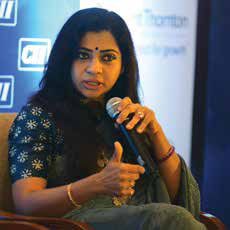
Shweta Shalini: The proof might lie in the pudding but the devil is in the details. CSR for a lot of people translated into Corporate Social Responsibility. Unfortunately, what we haven’t yet understood as a nation is that CSR actually means collective social responsibility. This also includes individual social responsibility as a person, which is the sum total of what, I as an individual, give back to my society, my country, and my people. Also, as corporates, what are we giving back to our society? As part of the government, I work with the (Now former) Chief Minister of Maharashtra, Shri Devendra Fadnavis, and we realized that there are a lot of people, corporates and various stakeholders who want to give back to society and are actually, in one way or another, giving back to society. But there was a need to channelize the entire thing, to maximize the impact. The maximum efficiency of impact is observed when all and every effort converges together for a final goal. That is precisely what we did when we established a Section- 8 company called Village Social Transformation Foundation, where the honourable Chief Minister of Maharashtra adopted a thousand villages. Under these thousand villages, we partnered with various corporates like JSW and Sangita ji, and also realised that there are other stakeholders in this transformational and giving back process. A large part of these stakeholders is the community itself. Do they want to change? Do they want to transform? Are they looking at social impact? A whole lot of communities and these communities also include urban communities. If you look at the large doctors’ community, or the lawyers’ community, they want to give back. But how do they give back to ensure that how they give back ensures impact at the grassroots level? Hence, we combine the various stakeholders including, community, corporates, and most importantly, Not For Profit Organizations.
We had to get all these people on the same platform, which is a mammoth task. That’s what we have been able to do as a model, and all credit goes to Shri Devendra Fadnavis, whose credibility was so huge that almost everybody came together on a single platform upon his initiative, and hence, we could see this detailing.
Collaboration is the biggest challenge because there are thousands of smaller setups who are working towards a similar goal, but it’s hard to bring all of them together for a singular purpose on one platform. How much of a challenge has it been for you, when you started something and there were multiple other organizations doing the same thing. How do you identify the right partner, and how do you convince them to come along for the common goal?
Sangita: When we started the JSW Foundation, approximately 20 years ago, there was no CSR as such at that time. It was our own initiative to try to help the people around us and it was done with our own passion. As the business grew, the funds given by the company towards causes became larger, and then we realized that whatever we were doing was done in a very small way. And then we started working with other NGOs. For instance, we are working with the TATA trust, we are also trying to work with the Bill Gates Foundation. So, if we work with other organisations, then everything gets scaled up. But the fear of scaling without a guaranteed output still remains. It is very important to have an audit for the situation and also not keep that money for administrative expenses. Accountability then goes up. Working with the government, of course, is a huge boon, as they actually know the full system. JSW Foundation is very pleased to work with the Maharashtra Government, but I hope that all other states in the country do the same. At the moment, I don’t see the same in Karnataka, or in Rajasthan. All NGOs and Businesspeople have to run around with all the red tape that one fids across the country.
How was the journey of identifying partners? When you announce an initiative and people show up to participate, how do you choose which ones you work with? What are the criteria that you look at?
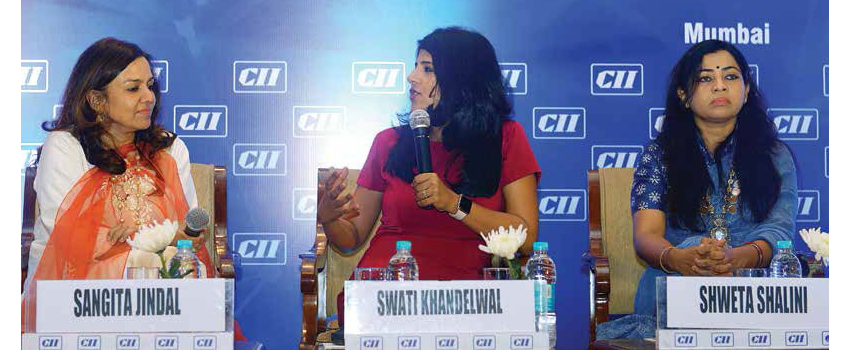
Shweta: There are two things that I would like to say here. Firstly, you have been using the word collaborate. We work on a singular ideology called converge, and there is a slight difference between collaborating and converging. When you collaborate, you basically come together and start working to achieve a certain goal, while convergence is more of you doing your work, while I do my work, but we tend to achieve the same goal because we know that ultimately we are going on the same path. So, what we primarily did is converge the efforts of various parties, and hence, it was easier for us to get partnerships. Also, you need to understand that when we talk about a social enterprise, it does not work like a normal private enterprise. In social enterprises, the people who need your services won’t be the ones who will end up ultimately paying for its services. For example, when you want to grow your private company, you would want to concentrate on the top line and the bottom line. But in a social enterprise, our fundamentals, and our understanding of the sector has been that it is important for you to scale up impact rather than scaling up the organisation in totality. When you tend to scale up the impact, the only way that you can go around it is partnerships. Because ultimately, external partnerships and internal partnerships are what will make the difference. I need to have entrepreneurs inside who not only believe in social change but also are social innovators in their own sense. For me, Gadchiroli will need to have a different approach to solving a problem than, say, Raigad. I need a social innovator who sits in Gadchiroli and thinks in a very different fashion to the person sitting in Raigad. The only factor that I, as an organization, need to see is that my partnership with these two social innovators needs to have a consistency and an understanding of the fact that both are passionate about social change, both understand the value that they will bring to the table and ultimately the convergence of their talent and abilities will happen to serve the goal that has been determined by the entire organization.
"When we started the JSW Foundation, there was no CSR as such at that time. It was our own initiative to try to help the people around us"
- Sangita Jindal
Finally, the whole mapping of what you do, and the analysis and assessment of whether or not it has made a difference, how is this achieved? What are certain ways and methodologies which can concretely measure the work done and convey to stakeholders the difference that you have made?
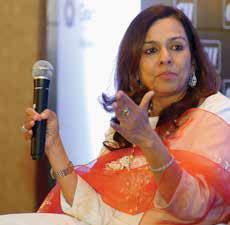
Sangita: What the JSW foundation does, is that once a year we allow our the organizations that we work with, for example, the Tata Institute of Social Sciences (TISS) and KPMG, to audit the work we have done from a third-party perspective. We come to know what we have done right and where we have been lacking. It is very important to get a third party audit for everything that you do.
Funding is always a challenge when you talk about these activities. There are a lot of causes that one talks about but who are the people who fund it? Why will they fund it? What are your inputs on that? Do you think funding is a challenge?
Shweta: It is a huge challenge because as I told you, the people who need your services won’t be the ones who will end up ultimately paying for its services. Hence, you always need to catch on to people who believe in your ideology of social change. There are such people available in the eco-system. The basic idea is to actually set global standards, and create an eco-system where these like minded people can come together and trust you with the fact that the roadmap is clear for them and it’s clear for you as well. What matters is that you are actually implementing the dreams that they are seeing. Until, say, JSW trusts me with their money, they will not give the money to me. What I keep telling charity organizations and NGOs, is that one of the largest stakeholders in the process is government ministries. Neither do they collaborate nor do they converge. It was a larger challenge for us to actually converge these departments together. That’s what I think we have been able to achieve. Ultimately, you need to understand that anything that is sustainable can be sustained, provided you have a clear cut model. I am proud to say that at least with village-level grassroots transformations, we have been able to identify the right model. Yes, we still need to look at social change, because no change happens immediately. We still need to stand the test of time, but I am very confident that we have figured out the right model.
So the model is right and it’s now just about treading that path and getting things done. Patience and perseverance are required. There are thousands of people out there who have great ideas and they really want to collaborate, but it’s just that the gap that needs to be bridged, and initiatives like this by CII aim to do just that.